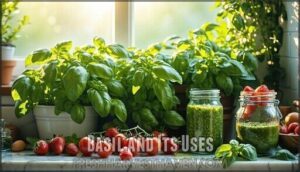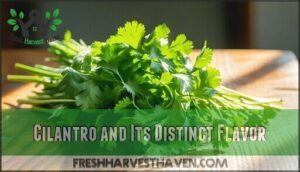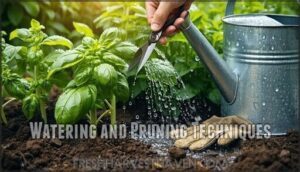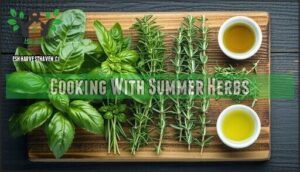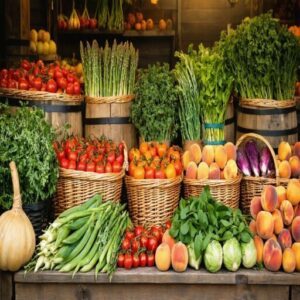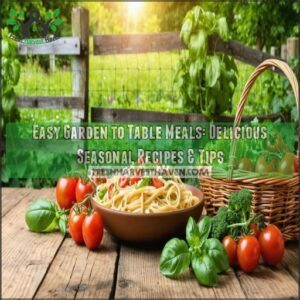This site is supported by our readers. We may earn a commission, at no cost to you, if you purchase through links.
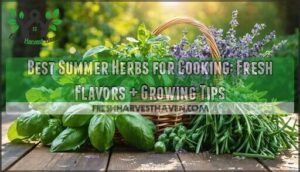 You’ll find that the best summer herbs for cooking deliver their most intense flavors when temperatures soar.
You’ll find that the best summer herbs for cooking deliver their most intense flavors when temperatures soar.
Basil leads the pack with its sweet, peppery punch that transforms simple tomato dishes into something magical. Cilantro brings bright, citrusy notes to Mexican and Asian cuisine, while mint offers cooling relief in drinks and Middle Eastern dishes.
Oregano, thyme, rosemary, and chives also thrive in heat, concentrating their essential oils for maximum flavor impact.
These heat-lovers don’t just survive scorching weather—they actually develop stronger taste profiles than their cooler-season counterparts, making summer the perfect time to experiment with their vibrant aromas and bold flavors that’ll revolutionize your cooking game.
Table Of Contents
- Key Takeaways
- Summer Herb Basics
- Popular Summer Herbs
- Herb Pairing Ideas
- Growing Summer Herbs
- Cooking With Summer Herbs
- Frequently Asked Questions (FAQs)
- What herbs are good for summer?
- What are the best herbs for cooking?
- Which herb adds the most flavor to dishes?
- What is the mother of all herbs?
- What are summer herbs flavors?
- How do you store herbs for winter?
- What are lesser-known summer herbs to try?
- Can herbs be grown indoors during summer?
- How do you prevent herbs from bolting?
- Are there herbs that repel garden pests?
- Conclusion
Key Takeaways
- You’ll get the best flavors from summer herbs like basil, mint, and cilantro when you add them at the end of cooking to preserve their bright, vibrant taste
- You can easily grow heat-tolerant herbs like oregano, thyme, and rosemary in your garden since they actually develop stronger flavors in hot weather
- You’ll want to use fresh herbs for garnishes and delicate dishes, but dried herbs work better for slow-cooked meals where you need concentrated flavor
- You can transform ordinary dishes by pairing unexpected herb combinations like basil with strawberries or creating herb-infused oils and marinades for grilling
Summer Herb Basics
Summer herbs transform your cooking with aromatic flavors that enhance everything from salads to marinades.
These versatile plants offer fresh, vibrant tastes while providing essential oils and nutrients that support your health throughout the warm months, with aromatic flavors.
Summer herbs deliver vibrant flavors and essential oils that nourish your body through the warm season.
Definition and Uses of Herbs
Beyond the kitchen, summer herbs are aromatic plants that transform ordinary dishes into culinary masterpieces. These versatile ingredients enhance cooking, support wellness routines, and add fresh dimension to your meals.
Herbs bring life to every dish, adding vibrant flavor and versatility from the kitchen to wellness routines.
Master these herb fundamentals:
- Fresh herb timing: Add delicate summer herbs at cooking’s end to preserve their bright flavors
- Storage techniques: Keep cut herbs fresh in water-filled jars for extended freshness
- Dried herb ratios: Use sparingly—dried herbs pack concentrated flavor punch
- Culinary applications: Experiment with herb flavor profiles in marinades, sauces, and seasonal salads. For a light and healthy option, consider herb salad combinations.
Types of Culinary Herbs
Understanding culinary herb families helps you pick the right flavors for your dishes.
Summer cooking herbs fall into distinct groups based on their herb flavor profiles and origins.
Mediterranean herbs like basil and oregano bring warm, aromatic notes to pasta and pizza. Asian herbs such as cilantro and Thai basil add bright, citrusy kicks to stir-fries and curries. Cool-climate herbs like mint and dill offer revitalizing touches to salads and beverages.
Rare herb varieties like culantro and lovage expand your flavor palette beyond popular summer herbs.
Each culinary herb family has unique growing culinary herbs requirements and herb regional usage patterns.
Fresh Vs Dried Herbs
When you’re weighing fresh summer herbs against dried ones, you’ll notice clear differences in flavor intensity and storage differences.
Fresh herbs deliver bright, vibrant flavors but spoil quickly, making them perfect for garnishes and last-minute additions.
Dried herbs pack concentrated punch—use one-third the amount for recipe adjustments.
Cost analysis shows dried herbs offer better value for frequent cooking.
Choose fresh for delicate dishes, dried for slow-cooked meals where herb suitability matters most.
Popular Summer Herbs
When summer hits, you’ll want to stock your kitchen with the season’s most flavorful herbs that can transform any dish from ordinary to extraordinary.
These aromatic powerhouses thrive in warm weather and bring fresh, vibrant tastes to everything from grilled meats to revitalizing drinks, making them a great addition to enhance the flavorful herbs.
Basil and Its Uses
You’ll find basil varieties like sweet basil perfect for summer cooking herbs.
This versatile herb shines in pesto variations and culinary pairings with tomatoes or strawberries.
Fresh basil elevates pizzas and salads, while dried works well in soups.
Basil propagation is straightforward—just snip stems and root them.
For basil storage, keep stems in water like flowers.
These herb pesto recipes will transform your summer dishes.
Mint and Its Refreshing Properties
Mint’s cool, invigorating properties make it the perfect summer companion. This versatile herb transforms everything from drinks to desserts with its invigorating kick.
Mint adds a revitalizing twist to summer, perfect for mojitos, teas, and vibrant dishes bursting with flavor.
Mint Varieties like spearmint and peppermint offer different intensities for various Culinary Pairings. Try these combinations:
- Watermelon and mint for cooling summer salads
- Chocolate and mint in desserts for classic indulgence
- Lamb and mint for traditional Mediterranean flavors
- Peas and mint for bright, fresh side dishes
Growing Mint couldn’t be easier—it thrives in containers with partial sun and moist soil. Health Benefits include digestive support and natural cooling properties. Mint Propagation happens quickly through runners, so contain it or it’ll take over your garden! Regular pruning keeps plants bushy and prevents flowering.
Cilantro and Its Distinct Flavor
With its bold, citrusy flavor, cilantro divides taste buds due to genetic differences in taste perception.
Cilantro’s bold flavor is a genetic lottery – you either love it or it tastes like soap.
This polarizing herb delivers fresh flavors essential to Mexican, Thai, and Vietnamese cuisines. Its distinct flavor brightens tacos, curries, and cucumber raita.
When growing cilantro, provide partial shade and consistent watering. Basil and cilantro create delightful herb pairings in salads.
If you need cilantro substitutes, try parsley or culantro for similar zest.
Herb Pairing Ideas
You can transform ordinary dishes into extraordinary ones by pairing herbs in unexpected ways that highlight their unique qualities.
These creative combinations will help you discover how different herbs complement each other and enhance your favorite summer recipes, using complete concepts to improve your cooking.
Basil and Strawberry Combination
Imagine this unexpected pair: basil’s warm, peppery notes dancing with strawberry sweetness.
This combination works magic in summer herb recipes and dessert ideas. Try it in drink infusions like flavored water or muddle both into cocktails.
The flavor profiles create surprising culinary applications – from fruit salads to ice cream.
These herb combinations showcase how summer herbs can transform ordinary summer desserts into something memorable.
Recipe variations include basil-strawberry shortcake or invigorating agua fresca.
Chives and Cashew Cream Cheese
Chives and vegan cream cheese create a sophisticated spread that’s perfect for summer entertaining. The mild onion flavor of chives transforms basic cream cheese into something special.
This Vegan Cheese Pairing works beautifully because chives don’t overpower the creamy base. Chive Variety Impact matters – garlic chives add extra depth while regular chives keep things light and fresh.
Here’s how to maximize this culinary herbs combination:
- Choose thick vegan cream cheese for better Cream Cheese Texture
- Add lemon zest for brightness and Recipe Customization
- Mix in minced garlic for savory depth
- Try different summer herbs from your herb garden like dill or parsley
Flavor Profile Analysis shows chives complement the tanginess without competing. This spread works on bagels, crackers, or as a veggie dip.
Dill and Mint Marinated Salmon
This summer herbs for cooking combination transforms ordinary fish into restaurant-quality dining.
When you marinate salmon with dill and mint, you’re creating layers of flavor that complement the fish’s natural richness.
Marinade Techniques: Blend fresh dill, mint, lemon juice, olive oil, and garlic for superior flavor profile.
Salmon Selection: Choose thick fillets and coat generously, letting them rest for 30 minutes.
Serving Suggestions: Pair with roasted vegetables or crisp summer salad.
Wine Pairing: Light whites enhance the dill and mint marinated salmon’s herby notes perfectly.
Growing Summer Herbs
Growing your own summer herbs transforms your cooking with fresh flavors right from your backyard or windowsill.
You’ll need well-draining soil with full sun exposure and consistent watering to keep these heat-loving plants thriving through the warm months, utilizing consistent watering.
Climate and Soil Requirements
Your herb garden’s success hinges on matching soil pH and sun exposure to each plant’s needs.
Most summer herbs demand well-draining soil with pH between 6.0-7.0 and full sun for ideal growth.
Mediterranean varieties like rosemary thrive in summer heat, while cilantro prefers partial shade.
Container size matters for indoor growing – choose pots with drainage holes.
Watering needs vary by species, but soggy roots kill herbs faster than drought.
Test your soil’s drainage by digging a hole and filling it with water.
Regular testing with a soil pH meter can help guarantee the best conditions.
Watering and Pruning Techniques
Once you’ve got your soil and climate sorted, mastering watering frequency and pruning methods becomes your ticket to herb heaven.
Smart summer herb care means checking soil moisture regularly—it should feel like a wrung-out sponge, not a desert or swamp.
Here’s your summer herb gardening playbook:
- Water when top inch feels dry – stick your finger right into the soil
- Prune above leaf nodes – this triggers bushier herb growth
- Snip regularly – prevents legginess and keeps plants productive
- Adjust container size – cramped roots limit growth potential
- Morning watering works best – gives plants time to absorb before heat hits
These techniques keep your herbs thriving through summer’s heat while maximizing flavor.
To further enhance growth, consider that earthworm castings add nutrients.
Common Heat-Tolerant Herbs
Mediterranean powerhouses like oregano varieties and sage propagation dominate scorching gardens.
Lemongrass cultivation brings citrusy punch to Asian dishes, while lavender uses extend beyond aromatics into culinary summer herbs.
Culantro care offers cilantro’s bold flavor without wilting.
These heat-tolerant herbs laugh at summer’s fury, delivering summer herb varieties that transform ordinary meals into extraordinary experiences.
For those seeking alternatives to cilantro, consider culantro’s robust flavor as a heat-tolerant substitute.
Cooking With Summer Herbs
You’ll discover that cooking with summer herbs transforms ordinary dishes into extraordinary meals with just a few fresh sprigs.
These aromatic powerhouses work beautifully in everything from simple herb-infused oils to complex marinades that’ll make your grilled vegetables and roasted meats sing with flavor.
Herb-Infused Recipes and Ideas
Creating herb-infused oils transforms ordinary dishes into culinary masterpieces. Start with basil or rosemary oils for drizzling over salads and pasta.
Herb-flavored butters with chives or dill elevate corn and potatoes instantly. Mix summer herbs for cooking like mint into herbal cocktails for invigorating drinks.
Try herb-infused vinegars with thyme for marinades. Perfect herb pairing combinations include basil with strawberries for dessert infusions.
These herb-infused recipes showcase culinary summer herbs beautifully. The solar infusion method enhances flavor extraction.
Grilled and Roasted Herb Dishes
Fire up your grill and watch ordinary vegetables transform into smoky masterpieces with the right summer herbs for grilling.
Herb crusts on roasted meats create an aromatic shield that locks in juices while delivering bold flavors.
Herb marinades work magic on everything from chicken to zucchini, infusing deep taste throughout.
For a Caribbean twist, try jerk seasoning blends.
- Picture rosemary-crusted lamb chops sizzling over open flames, releasing pine-scented smoke
- Visualize colorful bell peppers and eggplant tossed with thyme and oregano, caramelizing beautifully
- Imagine herb-marinated portobello mushrooms developing that perfect char while staying tender inside
Herb-Based Sauces and Marinades
Transform your summer cooking with herb-infused sauces and marinades that pack serious flavor punch.
Chimichurri Variations using parsley and cilantro create bold profiles for grilled meats, while Pesto Alternatives featuring mint offer fresh twists on classic recipes.
Master Marinade Techniques by combining olive oil with fresh herbs – let proteins absorb flavors for 1-24 hours.
Herb Oil Infusion amplifies taste when you blend basil, rosemary, or cilantro with quality oils.
Flavor Layering happens when you mix multiple summer herbs, creating complex taste experiences that elevate everything from seafood to vegetables.
Countless options exist for herb marinade recipes to enhance your dishes.
Frequently Asked Questions (FAQs)
What herbs are good for summer?
Picture Sarah’s first summer garden attempt: her wimpy store-bought basil lasted two weeks before dying, while her neighbor’s thriving herb garden flourished all season.
Summer’s star herbs include basil, mint, cilantro, dill, and parsley—they’ll transform your cooking with vibrant flavors and grow easily, making them a great choice for a summer garden with thriving results.
What are the best herbs for cooking?
You’ll want basil, cilantro, parsley, and mint for your kitchen arsenal. These versatile herbs pack bold flavors that’ll elevate everything from pasta to cocktails with their fresh, aromatic punch.
Which herb adds the most flavor to dishes?
Basil stands out as the most flavor-packed herb, delivering sweet, peppery, and aromatic notes that transform any dish.
Its versatility shines in everything from pesto to pizza, making it your go-to flavor powerhouse.
What is the mother of all herbs?
Parsley often earns the title "mother of all herbs" because it’s incredibly versatile, mild-flavored, and complements virtually every dish.
You’ll find it enhancing everything from soups to salads with its fresh, clean taste.
What are summer herbs flavors?
Summer herbs deliver bright, fresh flavors that transform your cooking.
You’ll taste basil’s sweet peppery notes, mint’s cooling freshness, cilantro’s citrusy zing, dill’s tangy brightness, and parsley’s clean, mild taste in dishes, which showcase the unique qualities of each herb.
How do you store herbs for winter?
A penny saved is a penny earned" – preserving herbs for winter requires strategic planning.
You’ll want to freeze, dry, or make herb butter and oils.
Clean herbs thoroughly, then freeze in ice cube trays with oil.
What are lesser-known summer herbs to try?
Try lovage for a celery-like flavor with lemony notes, perfect for soups and stews. Culantro offers intense cilantro taste that won’t bolt in heat, ideal for Caribbean and Asian dishes.
Can herbs be grown indoors during summer?
Your indoor garden becomes a fragrant oasis.
Yes, you can successfully grow herbs indoors during summer.
Choose a sunny windowsill, use well-draining potting soil, and water carefully.
Most herbs need partial sunlight minimum for healthy growth.
How do you prevent herbs from bolting?
Keep herbs cool and consistently watered. Harvest regularly to prevent flowering. Provide partial shade during peak heat. Plant heat-tolerant varieties like basil instead of cilantro in extreme temperatures.
Are there herbs that repel garden pests?
While chemical pesticides dominate garden shelves, nature’s arsenal offers gentler solutions.
Yes, several herbs naturally repel pests, including basil that deters flies and mosquitoes, mint that repels ants and rodents, and rosemary that keeps moths away.
Plant these aromatic defenders around your garden for natural pest control.
Conclusion
These incredible best summer herbs for cooking will transform your kitchen into a flavor powerhouse that’ll make your taste buds dance with joy.
You’ll discover that growing your own herbs isn’t just rewarding—it’s surprisingly simple when you follow proper watering and pruning techniques.
Fresh basil, mint, and cilantro deliver unmatched intensity compared to dried versions.
Your summer dishes will reach new heights when you pair these aromatic herbs with seasonal ingredients and experiment with herb-infused marinades and sauces.
- https://diabetesfoodhub.org/blog/6-best-fresh-summer-herbs-use
- https://www.hickoryfarms.com/blog/food-how-to/how-to-grow-a-summer-herb-garden.html
- https://timesofindia.indiatimes.com/life-style/food-news/6-summer-herbs-to-boost-your-energy-and-improve-digestion/photostory/121132830.cms
- https://www.acertainaesthetic.com/blog/my-favorite-summer-herbs
- https://ediblejersey.ediblecommunities.com/food-thought/food-thought-six-herbs-summer/

